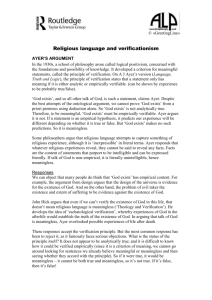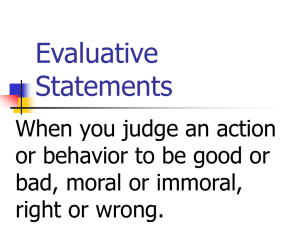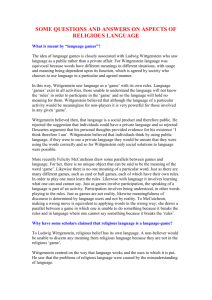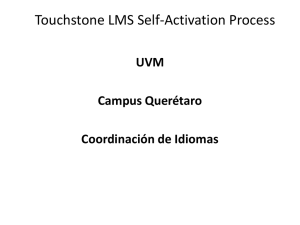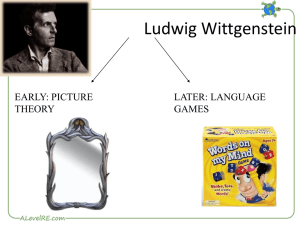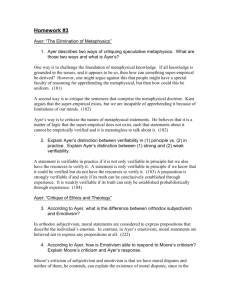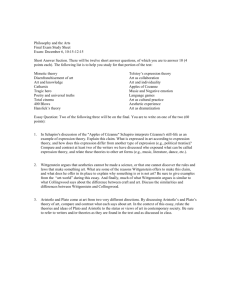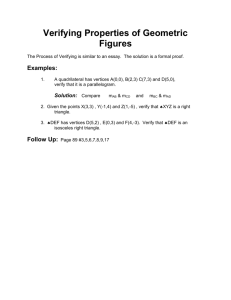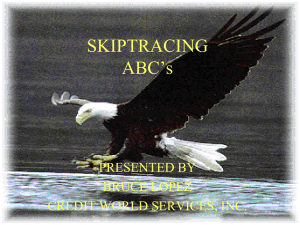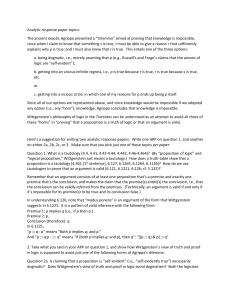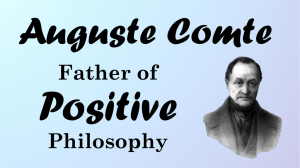Religious Language Introw
advertisement
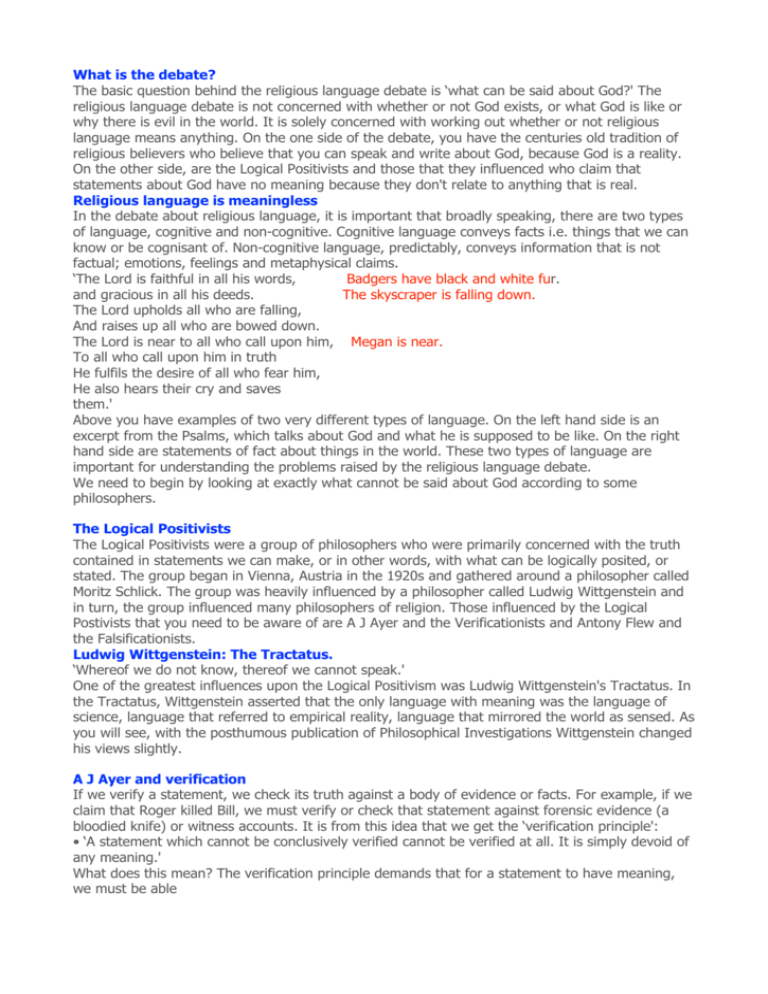
What is the debate? The basic question behind the religious language debate is ‘what can be said about God?' The religious language debate is not concerned with whether or not God exists, or what God is like or why there is evil in the world. It is solely concerned with working out whether or not religious language means anything. On the one side of the debate, you have the centuries old tradition of religious believers who believe that you can speak and write about God, because God is a reality. On the other side, are the Logical Positivists and those that they influenced who claim that statements about God have no meaning because they don't relate to anything that is real. Religious language is meaningless In the debate about religious language, it is important that broadly speaking, there are two types of language, cognitive and non-cognitive. Cognitive language conveys facts i.e. things that we can know or be cognisant of. Non-cognitive language, predictably, conveys information that is not factual; emotions, feelings and metaphysical claims. ‘The Lord is faithful in all his words, Badgers have black and white fur. and gracious in all his deeds. The skyscraper is falling down. The Lord upholds all who are falling, And raises up all who are bowed down. The Lord is near to all who call upon him, Megan is near. To all who call upon him in truth He fulfils the desire of all who fear him, He also hears their cry and saves them.' Above you have examples of two very different types of language. On the left hand side is an excerpt from the Psalms, which talks about God and what he is supposed to be like. On the right hand side are statements of fact about things in the world. These two types of language are important for understanding the problems raised by the religious language debate. We need to begin by looking at exactly what cannot be said about God according to some philosophers. The Logical Positivists The Logical Positivists were a group of philosophers who were primarily concerned with the truth contained in statements we can make, or in other words, with what can be logically posited, or stated. The group began in Vienna, Austria in the 1920s and gathered around a philosopher called Moritz Schlick. The group was heavily influenced by a philosopher called Ludwig Wittgenstein and in turn, the group influenced many philosophers of religion. Those influenced by the Logical Postivists that you need to be aware of are A J Ayer and the Verificationists and Antony Flew and the Falsificationists. Ludwig Wittgenstein: The Tractatus. ‘Whereof we do not know, thereof we cannot speak.' One of the greatest influences upon the Logical Positivism was Ludwig Wittgenstein's Tractatus. In the Tractatus, Wittgenstein asserted that the only language with meaning was the language of science, language that referred to empirical reality, language that mirrored the world as sensed. As you will see, with the posthumous publication of Philosophical Investigations Wittgenstein changed his views slightly. A J Ayer and verification If we verify a statement, we check its truth against a body of evidence or facts. For example, if we claim that Roger killed Bill, we must verify or check that statement against forensic evidence (a bloodied knife) or witness accounts. It is from this idea that we get the ‘verification principle': • ‘A statement which cannot be conclusively verified cannot be verified at all. It is simply devoid of any meaning.' What does this mean? The verification principle demands that for a statement to have meaning, we must be able to check its claims against things that exist. For example, if we say ‘it's raining outside' it's easy to check or verify the claims of this statement by stepping outside and holding our hand out to check for rain. A statement like ‘there is life after death' is less easy to verify. The verificationists held that there were two types of statement that are meaningful: 1. Analytic propositions: these are statements that contain all the information within the statement that we need to verify it e.g. ‘red is a colour' or ‘2+2=4.' 2. Synthetic propositions: these are statements that can be confirmed through the use of the senses (i.e. by recourse to empirical data) e.g. ‘it's raining outside' or ‘that bridge has collapsed.’ As a result of this, verificationists hold that non cognitive, metaphysical statements (i.e. statements about things beyond reality such as God, heaven, angels) are completely meaningless (as are meaningless staements like ‘square circles are green'), as we have no way of verifying whether or not these statements are meaningful. As A J Ayer puts it: ‘The term ‘god' is a metaphysical term. And if ‘god' is a metaphysical term, then it cannot even be probable that God exists. For to say that ‘God exists' is to make a metaphysical utterance which cannot be either true or false. And by the same criterion, no sentence which purports to describe the nature of a transcendant god can possess any literal significance.’ Ayer does not just deny God's existence, he denies the possibility of God's existence altogether on the grounds that there is no way of empirically verifying his existence. Needless to say, Ayer would disagree with all of the traditional arguments for the existence of God, as none of them conclusively and empirically prove the existence of God. There are two forms of the verification principle: strong and weak, which are as follows: • Strong: this is the form mentioned above: that an assertion only has meaning if it can be verified according to empirical information. Anything else is meaningless. • Weak: this form of the principle came to prominence later. It states that for an assertion to be true, one simply has to state what kind of evidence would verify its contents. This form was developed to allow historical facts to have meaning. For example, we know that Hitler invaded Poland in 1939, but we cannot see it happening and therefore verify it. The weak principle therefore simply requires that we state what kind of evidence would be enough to make a statement meaningful (e.g. eye-witness accounts of the residents of Krakow as the tanks rolled in).
